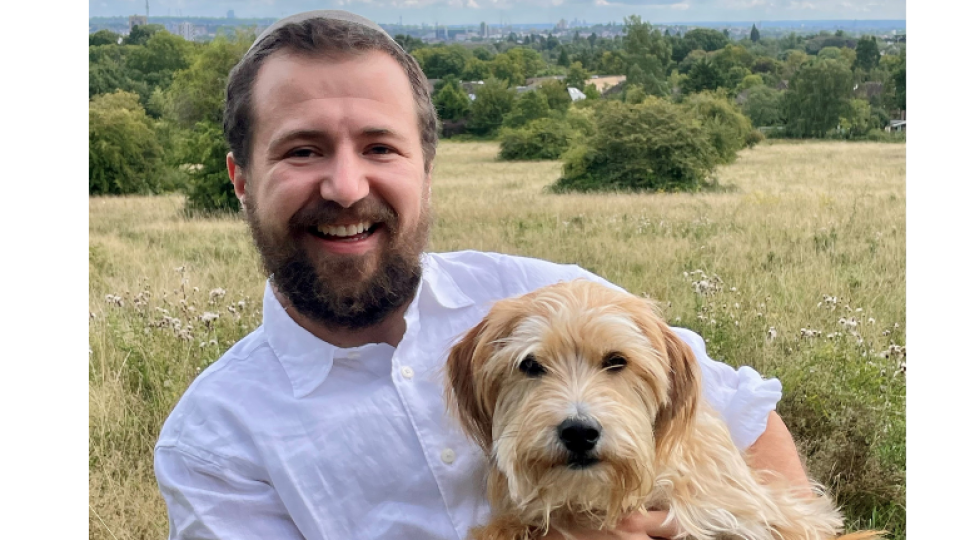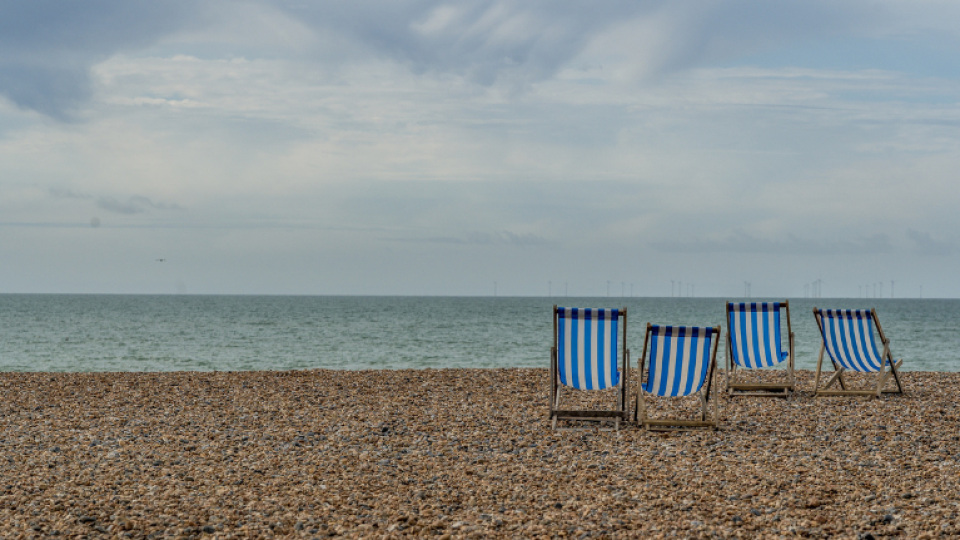
Faith
UWL Faith Service: Supporting spiritual wellbeing
Available for all students and staff, regardless of religious or non-religious belief.
The UWL community reflects the vast diversity of London, with students and staff from a wide range of religious, cultural and philosophical backgrounds. This diversity makes the campus a rich environment in which to study and work.
We understand that the beliefs we live our lives by are of vital importance to the wellbeing of our staff and students and that religious and cultural customs, diet and prayer can be a central part of welfare and wholeness. At UWL, we work to grow a sense of community on campus in which everybody feels welcome.
On this page you can:
Meet your Interfaith Adviser
Carter Weleminsky serves as our Interfaith Adviser, offering inclusive and confidential pastoral support to the entire UWL community. With a background in various interfaith roles at universities and charities, Carter understands the varied experiences of university life. Carter is dedicated to fostering interfaith dialogue and cohesion across our diverse campuses with a focus on supporting minority faith groups.
Carter is here to listen and provide support to all members of UWL, regardless of their religious or non-religious beliefs. Whether you want to talk about personal concerns, faith or philosophy, navigating campus life or anything else on your mind, our Interfaith Adviser is available to support you.
Carter also advocates on issues related to faith and belief on campus, as well as facilitating connections to local faith communities.
Please do not hesitate to get in touch if you would like to talk to Carter or have any questions: faith@uwl.ac.uk.
Pastoral care
Sometimes it’s good to talk. Pastoral care is a resource for all students and all staff at UWL. It is completely inclusive: whoever you are, you are welcome. This includes those who are atheist or agnostic or who do not align themselves with any philosophy.
You can come and have a confidential conversation about any concerns, worries or anxieties you may be having – nothing is too big or too small. From life’s big philosophical questions to everyday concerns, and everything in between. You may just want a space to talk about a particular topic to a non-judgemental, compassionate and sympathetic ear.
University is a formative, exciting and challenging place. It can be a time in life that raises questions about identity, belief and your own personal values. The Interfaith Adviser is here to help you explore these kinds of questions.
Previous students and staff have used the service to talk about:
- stress or loneliness
- academic or workload worries
- relationship or family difficulties
- life transitions such as settling into university life
- matters of social action and justice
- loss or bereavement
- exploring your faith (or no faith), beliefs or philosophies (of whatever kind)
- reflecting on your identity, values or ethics
You do not have to be in an emotional or spiritual crisis to meet with the Interfaith Adviser. The Interfaith Adviser is a practised and reflective listener and if needed can help connect you to other wellbeing services available for staff and students.
You can have a one-off conversation or a series of appointments. Conversations can be held in a variety of places, such as over coffee, online or in a private meeting space. If you need someone to talk to, you are welcome to contact the Interfaith Adviser to arrange a meeting at a time that suits you. You can also pop in to a drop-in session without an appointment. You can find out more information about appointments and drop-ins below.
-
Making an appointment
You can arrange an appointment by emailing faith@uwl.ac.uk. The Interfaith Adviser will try to provide support as quickly as possible, but do bear in mind that his working days are Tuesdays, Wednesdays and Thursdays.
You can come and have a one-off conversation or a series of appointments. Conversations can be held in a variety of places, such as over coffee or online.
Staff meetings are conducted discreetly and can be arranged off-campus if necessary to ensure privacy and confidentiality.
-
Drop-in schedule
Our informal pastoral care drop-ins are open to everyone. Stop by for a chat over a cup of tea.
Current drop-in schedule:
- Ealing site (SMR): Every Wednesday, 11am - 12pm, The Street (ST.GF.002)
- Brentford site (Paragon): Every Thursday, 3pm - 4pm, PH104
Prayer and contemplation space
All of UWL’s campus sites have prayer and contemplation rooms. These rooms are for the use of all students and staff who want to foster some tranquillity and calm amid the challenges of study, research and work. Please be mindful of other users when you are in the space.
Locations
- Ealing site (SMR): Prayer room - BY.B1.007
- Ealing site (SMR): Contemplation Zone - BY.04.002
- Century House: Prayer room - CE.02.X01
- Brentford site (Paragon): Prayer room - PH121
- Fountain House: Reflection Room - FH.10.005
A regular room booking for Jumma prayers is available every Friday at SMR (Ealing) from 12pm - 3pm in room WK.02.002A.
-
SMR site – interim prayer room schedule (6-20 January 2025)
Due to refurbishment works on the basement floor, the prayer room will be inaccessible for two weeks from 6-20 January. Alternative space has been arranged. Please refer to the timetable below for the designated prayer room locations for each day. Thank you for your understanding and cooperation as we work to improve our campus.
The small prayer room (BY.04.002) on the 4th floor will remain accessible and usable during this time.
If you encounter any issues with the Interim Prayer Room during this time, please don’t hesitate to email: facilitieshelpdesk@uwl.ac.uk and faith@uwl.ac.uk.
Timetable:
- Monday 6 January - WK.01.013
- Tuesday 7 January - WK.01.013
- Wednesday 8 January - WK.01.008
- Thursday 9 January - BY.GF.003
- Friday 10 January - WK.01.008
- Monday 13 January - WK.01.013
- Tuesday 14 January - WK.01.008
- Wednesday 15 January - WK.01.008
- Thursday 16 January - WK.01.008
- Friday 17 January - WK.01.013
- Monday 20 January - WK.01.013
Download a copy of this timetable (pdf, 118.21kb)
FAQs about faith and pastoral care
-
Do I have to be religious to use the Faith Service?
The Faith Service is available to everyone in the UWL community, including all staff and students. We support all – including those who have no religious beliefs or who do not align themselves with any philosophy. Overall, those who have no religious beliefs tend to use our services more.
-
I am a staff member; can I use the Faith Service?
The Faith Service is dedicated to delivering a flexible and accessible support service to university colleagues. We can provide a listening ear and chat with you through a range of issues that you may be experiencing, such as workload stress or bereavement. The Interfaith Adviser is also available to advocate for staff on issues related to faith and belief on campus.
The Faith Service is for the use of all staff. This includes professional and academic staff, part time staff, student staff (including PhD Students who teach), interns, staff on parental or health leave, consultancy staff and contracted staff. We are a non-judgemental and completely confidential space. If you have any questions, do not hesitate to ask the Interfaith Adviser (faith@uwl.ac.uk). Staff meetings are conducted discreetly and can be arranged off-campus if necessary to ensure privacy and confidentiality.
Additionally, staff can also access the Employee Assistance Programme (EAP), Health Assured, which is open 24 hours a day, 365 days a year. They provide confidential support services to employees and their immediate family. Please contact Health Assured at 0800 028 0199.
-
Is pastoral care therapy?
Interfaith Advisers are not trained counsellors and the pastoral care we offer is not professional therapy. Pastoral care is a form of emotional support that can be found in numerous traditions. We are interested in journeys through life and will listen reflectively to anything you share.
We know that life is full of beginnings and endings, miserable times and joyful times, delights and trials and that sometimes we need company. After listening, we may suggest you access other support services and can help you with that.
Unsurprisingly, we are always happy to talk about faith and belief, but in the context of pastoral care we would only do that at your request.
Students can also access specialist support through the counselling team. Staff can alternatively access support through the Employee Assistance Programme, Health Assured, which is open 24 hours a day (phone: 0800 028 0199).
-
What is spiritual wellbeing?
Spirituality can mean different things to different people. It can encompass a variety of beliefs and practices, both religious and secular, but common themes include:
- Seeking connection: Building the best relationship with ourselves, others, and what may lie beyond
- Finding meaning: Helping us understand our place, purpose, and feel content in life
- Providing hope: Offering a sense of optimism, particularly during challenging times
- Offering support: Providing comfort and resilience throughout periods of suffering and loss
Spiritual wellbeing involves fostering a sense of connection, purpose and inner peace. This includes embracing values like honesty and compassion, feeling connected to ourselves and others and engaging in reflective practices such as mindfulness, meditation or prayer.
It also encompasses creativity, self-expression and, for some, religious practices and belief in a higher being. At UWL, we recognise that spiritual wellbeing is crucial to overall health and happiness.
-
Is the Faith Service confidential?
The Faith Service works within a strict code of confidentiality.
The maintenance of appropriate confidentiality is essential to those who seek pastoral care and to the University of West London as a provider of it. All interactions with the Faith Service, including scheduling, attendance and content of your appointments are strictly confidential to UWL’s Faith Service. No record of pastoral care is contained in any academic or HR file.
Please see UWL’s privacy and data protection policy for more information. Ask the Interfaith Adviser if you have any questions or concerns.
In exceptional circumstances, the Faith Service may need to share information without consent in the following exceptional circumstances only:
- a student or staff member is considered to be at risk of harming themselves or others
- if there is a legal requirement to do so
A decision to breach confidentiality in the circumstances set out above would be decided by the Interfaith Adviser and the Head of Wellbeing. This would always be discussed with the staff member or student in advance.
-
Does UWL cater to religious dietary requirements? Is the meat in the canteen halal?
Our campus catering services provide daily halal, vegan and vegetarian options, ensuring that many members of our community can enjoy meals in accordance with their beliefs. Meals are clearly labelled - including which meat options are halal. Please ask a member of the kitchen team if you are unsure about anything.
If you have other religious or cultural dietary needs, such as Jain or kosher, do get in touch with the Interfaith Adviser who can offer guidance.
Important note: outside term time since there are fewer students on campus, there is a reduced menu – this is to avoid food wastage. Please talk to a member of the kitchen team if you have concerns about dietary requirements during the holidays.
-
I have an exam or assessment that has been timetabled for a religious or cultural holiday, what should I do?
UWL will endeavour to take into account religious observance requirements when timetabling assessment deadlines and exams. Commonly observed festival dates are publicised before every academic year, but unfortunately unintentional errors and oversights can sometimes be made.
UWL enables students to extend deadlines up to three times per year using the 'self-certify' system for extenuating circumstances. Observance of a holiday listed on UWL’s Interfaith Awareness Calendar (available below) qualifies as a valid reason. For more information and to apply, visit UWL's extensions and mitigating circumstances webpage and apply in advance of the deadline.
If you have a formal written exam that is timetabled for a religious or cultural holiday, please contact examinations@uwl.ac.uk as soon as possible. For other departmental assessments, such as in class-tests and presentations, please apply online well in advance, and let your School/College academic administrator know.
You can also discuss any timetabling challenges with the Interfaith Adviser (faith@uwl.ac.uk) for support and advocacy.
-
I am a student in crisis and am in need of urgent help, what should I do?
The Faith Service is not an emergency service. For urgent help on campus, call 3333 from any university phone or call 020 8231 3333 from any phone or speak to one of the reception desks or security officers.
Students can contact the welfare team between 9am – 5pm, on 020 8231 2313 or by emailing studentwelfare@uwl.ac.uk. Alternatively, students can use UWL’s Report + Support service.
If you are concerned about keeping yourself safe and need immediate help and support, you should call 999 or go to the nearest Accident and Emergency (A&E) department.
The closest A&E departments in Ealing are:
- Ealing Hospital, Uxbridge Road, Southall, UB1 3HW (no children's A&E)
- West Middlesex Hospital, Twickenham Road, Isleworth, TW7 6AF
- Northwick Park Hospital, Watford Road, Harrow, HA1 3UJ
The closest A&E department in Reading is:
- A&E Royal Berkshire NHS Foundation Trust, Centre Block, Craven Road, Reading, RG1 5AN
Alternatively, you can call your GP or call for NHS advice on 111.
Please also see the below useful links and contacts:
- Togetherall - Confidential, online 24/7 support platform. Get free access by creating an account using your UWL email address.
- The Samaritans - Freephone 116 123 (Daily; 24 hours a day). Confidential emotional support to anyone who is despairing.
- Papyrus HOPEline UK - UK suicide prevention: Phone 0800 068 4141 or text 07786 209697.
-
I have suffered a bereavement, what support is available to me from UWL?
Grief is often a challenging process, unique to every person. Our compassionate pastoral care service aims to provide a safe and supportive environment for those who are bereaved. We are committed to respecting your individual experiences, which is why we support people of all faiths, philosophies, beliefs and those of no religious belief.
The Faith Service offers bereavement support to UWL students and staff. Students or staff who would like support with navigating bereavement should feel free to be in touch with the Interfaith Adviser (faith@uwl.ac.uk), who can offer pastoral and practical support.
Students can also access bereavement support through the Counselling team. Staff can alternatively access support through the Employee Assistance Programme, Health Assured, which is open 24 hours a day (phone: 0800 028 0199).
If you have recently had a bereavement, you might also have some practical concerns about what you need to do and who you need to tell. Students should first reach out to their personal tutor or supervisor to discuss your options around your studies. Staff should speak to their line manager about support and time off work and consult the Special Leave Guidelines in the Human Resources Sharepoint.
-
Which other organisations can help me following a bereavement?
At a time of bereavement culturally and religiously sensitive support can also be found from a number of communities:
- Church of England
- Humanists UK
- Jewish Bereavement Counselling Service
- Methodist Church
- Muslim Bereavement support service
- Muslim Youth Helpline
- The Sikh Helpline
Further support can be found through the following organisations:
- Ataloss - Support services, information, helplines and helpful reads for anyone who has been bereaved, whatever their age, loss or background
- Bereavement Advice Centre - Free helpline for people who are bereaved as well as information on practical matters and coping with grief
- Child Bereavement UK - Provides support for anyone who has lost a child or is supporting a grieving child
- The Compassionate Friends - A charitable organisation of bereaved parents, siblings and grandparents dedicated to the support and care of others
- Cruse Bereavement Care - Provides bereavement support, either face-to-face or over the phone, from trained volunteers around the UK
- The Good Grief Trust - Offers support and resources created by people who have personally experienced bereavement
- Stillbirth and Neonatal Death Charity (SANDS) - Provides information and support for anybody affected by the death of a baby
- Sue Ryder - Offers bereavement support, as well as care for people with terminal illness and neurological conditions
- WAY (Widowed & Young) - Provides community support and resources for people widowed under the age of 51
If you have queries about the steps that need to be taken when someone has died, such as registering a death, you can find information on the government website.
-
I have experienced a hate crime or discrimination because of my religion or belief, what support is available to me?
The Faith Service is not an emergency service. For urgent help on campus call 3333 from any university phone, (alternatively call 020 82313333 from any phone) or speak to one of the reception desks or security officers. If you are concerned about keeping yourself safe and need immediate help and support, you should call 999.
If you are a UWL student or staff member and have experienced a hate crime, we encourage you to inform the university using Report and Support – this can be done completely anonymously. The Interfaith Adviser (faith@uwl.ac.uk) and Counselling team can also offer support.
Additionally, Catch (Communities Against Hate) are a support service for people who have experienced a hate crime and can give specialist advice to those who have been targeted with violence, abuse or harassment. They can also connect you to local community organisations.
If discrimination on the grounds of religion or belief has affected you, we encourage you to discuss your concerns with the Interfaith Adviser, as they can offer support and advocacy. You are welcome to come and talk confidentially about an issue even if you do not want to take any action in response. You can find more information and support about discrimination based on religion or belief on the Citizens Advice website.
-
Are there faith and belief student societies at UWL? Does the Faith Service work with them?
For a list of current student societies, or if you are interested in starting your own society, please see the Students' Union website.
The Faith Service collaborates with UWL’s faith and belief societies on campus to build a supportive community for all students. The Interfaith Adviser also encourages and supports collaborations between student groups.
If you would like to work on an interfaith project, please get in touch at faith@uwl.ac.uk.
The Interfaith Adviser and representatives from student faith societies also sit on The Faith and Spirituality Advisory Group, which meets once a term. This group reports annually to the Equality, Diversity and Inclusion Advisory Group.
-
Can you link me to the national student faith groups?
You can find out more about national student faith groups through the links below:
-
Does the Faith Service have an ethos or mission statement?
The core values of the Faith service are support, respect and community. By promoting these commitments, we aim to foster a university where all staff and students feel supported and valued, irrespective of their individual beliefs and backgrounds.
Support: We offer support for everyone in the UWL community. This support takes many forms, from informal conversations over coffee to one-to-one bereavement support. Part of this support includes being available across all UWL campuses and spaces and attending different community events.
Respect: We seek to promote mutual understanding between those of different faiths, beliefs and philosophies, including sharing together the richness of each tradition. We seek to be inclusive and open-minded. We are careful with how we share our faith, and never assume that others do, or should, agree with us.
Community: We are committed to bringing people together and creating community cohesion. We help the UWL community to manage conflict and disagreement: resolving disputes and creating spaces for listening to take place. We believe that interfaith dialogue can enable greater understanding of our own beliefs and traditions.
-
Does UWL have a faith and spirituality policy?
Yes, our faith and spirituality policy is available to download on our policies and regulations page. It can be found under the "Supporting Students" section.
Useful resources
- UWL Interfaith Awareness Calendar 2024-25 (pdf, 216.83kb)
What our students and staff say
The Interfaith Adviser helped me navigate my spiritual journey with patience, understanding and empathy."
I was struggling with stress, and the Faith Service’s open-mindedness and willingness to listen without judgement made me feel valued and supported."
The Interfaith Adviser provided invaluable support during my bereavement, helping me find courage and comfort."
Nearest faith communities to campus
Find out more about local places of worship.
-
Ealing (St Marys Road) site
- Mosque: West London Islamic Centre
- Church: St Mary’s Church
- Hindu temple: Shri Kanaga Thurkkai Amman Temple
- Gurdwara: Ealing Gurdwara: London Sikh Centre
- Synagogue: Ealing Synagogue
-
Brentford (Paragon) site
- Mosque: West London Islamic Centre
- Church: Church of St John the Evangelist
- Hindu temple: Hanuman Hindu Temple
- Gurdwara: Ealing Gurdwara: London Sikh Centre
- Synagogue: Ealing Synagogue
-
Reading campus
- Mosque: Central Jamme Masjid
- Church: Reading Minster Church
- Hindu temple: Reading Hindu Temple
- Gurdwara: Sri Guru Singh Sabha Gurdwara Reading
- Synagogue: Reading Hebrew Congregation




